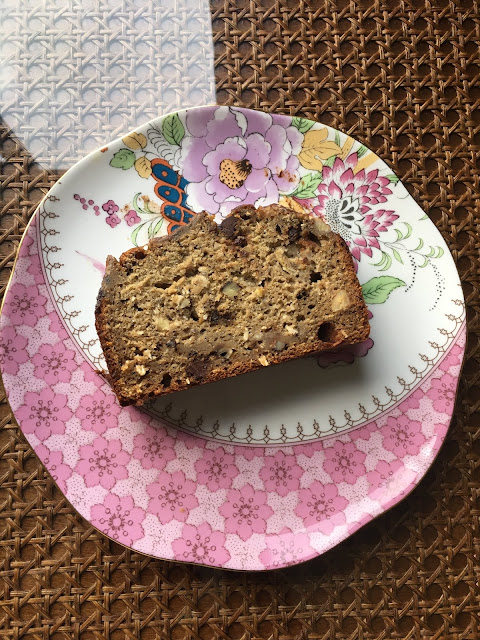Fasting, Feasting*
I must admit that in our family of four, I struggled the most with Lent. My brother is a dal-roti person. By that I mean that he'll eat pretty much anything without any grumbling whatsoever so long as it is edible. My taste buds just happen to be, well, more discerning. Which explains both why he was the favourite with my mother on the food/cooking count, and also why he is not the one trying to get a food blog going.
Whilst Lent was a breeze for my brother, for me, on the other hand, by the end of the first week, the sight of just dal and a vegetable dish on the table was enough to move me to tears. In order to accommodate my carnivorous tendencies, exceptions were sneaked into our Lenten abstinence. On a few occasions, although we gave up meat, fish was allowed. The sneaky exceptions aren't unique to my family. I know people who give up sweets during Lent, but not chocolates. Those who give up liquor, except on the weekends. And so on.
The idea of abstinence is not unique to Christianity. Fasts are not uncommon in Hinduism, which is the majority religion in India. In Islam, Ramadan (or Ramzan, as we call it in India), is traditionally observed as a period of fasting and abstinence.
The purpose of abstinence in all religions, I suppose, is linked to the idea of self-denial, and is intended to promote self-discipline and spiritual thinking in the individual. For the average person, though, I'm not sure a fast always works that way. To begin with, it only refocuses the mind even more strongly on that which is being given up. As a child, meat-free Lents only induced me to dream about all the meat I would stuff down my throat on Easter. This also explains all the sneaky exceptions that people often introduce into their fasts. On the other hand, if one is able to transcend that initial phase, I think fasting can teach you how little you really need to get by. That is an important lesson in a world driven by consumerism and mindless self-indulgence. When I gave up all sweets (including chocolate, yes) a few Lents ago, for the first couple of weeks, all I could think of was sugar. But that changed as the weeks wore on, and I realised that I really could do without sugar quite happily. After a point, the cakes drenched in chocolate buttercream in the windows of my neighbourhood patisserie that I would ordinarily lust after, just seemed a picture of excess (it is another matter that as soon as Lent was over, I was back to lusting after chocolate cake). Once you are over your initial phase of struggling with the idea of depriving the self, there is a another important lesson that abstinence can teach you. It is to be grateful for blessings, big and small, and to spare a thought for the less fortunate. I don't think I can project this more effectively than Harsh Mander has in his recent piece in The Hindu which documents the inspiring story of two young Indian men who decided to abstain not just from food, but from their highly privileged lives for a little while.
I don't think you need a religious reason to abstain or to reflect. But I do happen to have a religious prompt - today is Ash Wednesday and I've decided to give up sweets until Easter (which is on April 8 this year). As I type, the sheer madness of this idea is hitting me with some force. Sweet dreams to me.
At the end of this long, rambling post, I am happy to report that I have been up to some good in the kitchen. I tried baking some focaccia using this easy recipe from the lovely ladies at "Show Me the Curry". I substituted half the all purpose flour in the recipe with wholewheat flour in an attempt to make the final product just a little healthy. Bad idea. All purpose flour or maida as we call it in India yields much softer baked products, whereas wholewheat makes for denser results. I think one needs to tweak the quantities of yeast/moisture in the recipe to successfully substitute wholewheat for all purpose flour.
 |
| En route to the oven |
My focaccia was definitely tasty and fairly easy to put together, but it wasn't as soft as I'd hoped it would be. I brushed the dough with a mixture of dried oregano and olive oil before I slipped it into the oven, which proved to be a good combination of flavours. As the recipe says, you can substitute with anything else from sun dried tomatoes to jalapenos. Just make sure you use all purpose flour all the way!
 |
| Home made focaccia |
PS: The title of this post is "inspired" (Annu Malik style) by an Anita Desai book of the same name. By the way, strongly recommend that you read it if you get the chance.


Never was a dal-roti person.. There's a lot I would do for a good meal.. Apart from making it myself.. A good meal, tipple of my choice, without or without anyone on the opposite chair, would be as to close to perfect as it can get..
ReplyDeleteBut Don Quixote I am not.. I learned early, with prodigious help from the numerous saturday afternoon roti making sessions, that grumbling about the food laid on the table will be met with a recommendation to eat the lovely green grass growing on the field below.. Irrespective of the number of dogs and few of our firends who helped the grass just a little bit faster..
Also, the quiet acceptance of dal roti meant a saturday afternoon with lovely mutton and rotis.. Rotis which I didnt have to labour over..